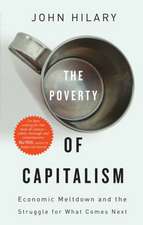Voluntarism, Community Life, and the American Ethic
Autor Robert S. Ogilvieen Limba Engleză Hardback – 17 iun 2004
"Students and faculty interested in the issue of homelessness will find the book instructive... Recommended." Choice
Why do people volunteer, and what motivates them to stick with it? How do local organizations create community? How does voluntary participation foster moral development in volunteers to create a better citizenry? In this fascinating study of volunteers at the Partnership for the Homeless in New York City, Robert S. Ogilvie provides bold and engaging answers to these questions. He describes how volunteer programs such as the Partnership generate ethical development in and among participants and how the Partnership s volunteers have made it such a continued success since the early 1980s. Ogilvie s examination of voluntarism suggests that the American ethic is essential for sustaining community life and to the future well-being of a democratic society."
Preț: 231.26 lei
Nou
Puncte Express: 347
Preț estimativ în valută:
44.26€ • 45.92$ • 36.99£
44.26€ • 45.92$ • 36.99£
Carte tipărită la comandă
Livrare economică 17-31 martie
Preluare comenzi: 021 569.72.76
Specificații
ISBN-13: 9780253344236
ISBN-10: 0253344239
Pagini: 288
Dimensiuni: 156 x 235 x 15 mm
Greutate: 0.58 kg
Editura: MH – Indiana University Press
ISBN-10: 0253344239
Pagini: 288
Dimensiuni: 156 x 235 x 15 mm
Greutate: 0.58 kg
Editura: MH – Indiana University Press
Recenzii
Ogilvie (city and regional planning, Univ. of California, Berkeley) attempts to place a case study of volunteers at two New York City church--based homeless shelters into a larger, sociological, theoretical framework. He is more successful in presenting a vivid portrait of the volunteers than he is at theorizing. The study of the centers is careful and insightful, but his treatment of the community literature is superficial and selective. The author draws on the concept of moral communities (Seymour Mandelbaum, Open Moral Communities, CH, Oct'00, 38--1013) as well as the literature of communities of practice (Etienne Wenger, Communities of Practice, 1998). A final chapter that is both practical and prescriptive discusses the process of building community organizations that create community, rather than those designed to serve the community. Students and faculty interested in this issue of homelessness will find the book instructive, but those interested in larger issues in community sociology will likely be disappointed. Summing Up: Recommended. Upper--division undergraduates and above.A. A./P>--A. A. Hickey, Western Carolina University"Choice" (01/01/2005)
Cuprins
Notă biografică
Robert S. Ogilvie












